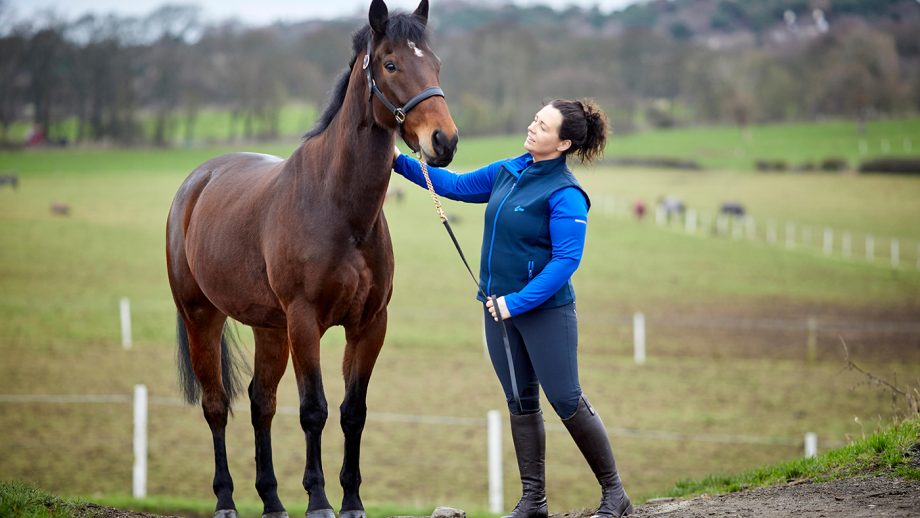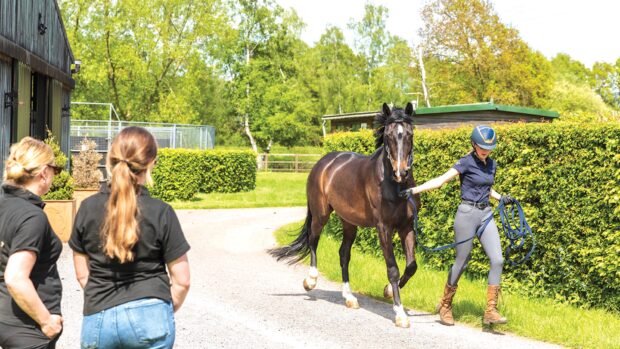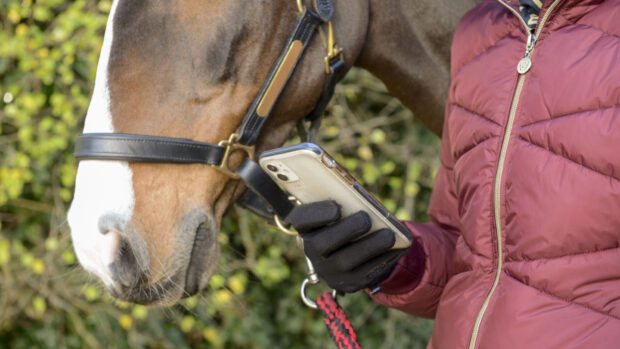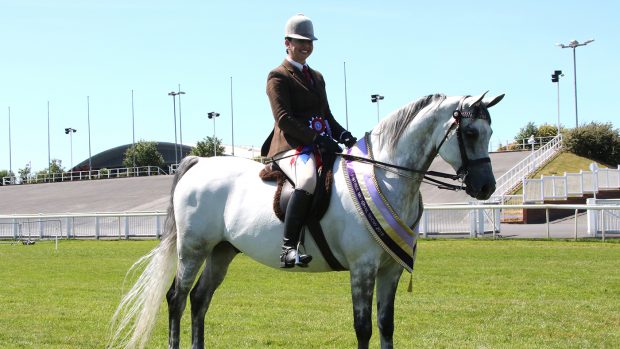When it comes to selling your horse, do you listen to your head or your heart? Alex Robinson asks industry experts how riders can make this tricky decision
Selling can be one of the most challenging and emotionally charged parts of owning a horse. Not everyone can – or wants to – keep an animal until the end of his days and a sale is usually inevitable at some stage of a partnership, especially if you’re a competitive rider. While obvious physical limitations, such as the size of the horse, might force the hand, there can be other, more complex situations which suggest it may be time to seek out a new home. But when should you sell a horse?
Vere Phillipps (pictured) has bought, sold and produced competition horses for over 40 years. Alongside winners of grand prix showjumping finals and Olympic, world and European eventing championships, he has also found several stars of the hunting field and National Hunt scene. And he’s witnessed his fair share of owners in limbo along the way.
From a competitive standpoint, there are several reasons a rider might decide to part with a horse.
“I divide possible sale situations into three categories,” says Vere, who found Ros Canter’s 2018 world eventing champion Allstar B, to name just one. “There are those who buy a young horse, school him, sell him for a profit and leave a leg on for the next owner to get a bigger price [leave some room for improvement rather than selling a horse at its peak price].
“There are then riders who keep the horse right through the levels and despite being offered big money never sell and reap the glory instead. The third is the rider who keeps the young horse, wins a bit and then sells him while he’s still got a big future ahead. These are usually the most profitable people. The value comes from a well-produced, capable animal that a professional can see has a big future as a global championship prospect.
“A lot of enjoyment can still be had from watching a horse you’ve produced move on with someone else. If you think your horse could possibly be very good in a certain sphere and you feel he’s not going to reach it with you, it’s best to sell while he’s on the way up, ideally before he reaches his nine-year-old year as he’s still got time to reach his potential.”

Many professionals buy youngsters to produce and sell on for a higher price, although Vere Phillipps finds his biggest market is for five- and six-year-olds
But not every competitive rider seeks the same type of campaigner.
“My biggest market is for young horses – five-, rising six-year-olds – though I always maintain that if a horse is sound when he’s nine he’s likely still to be sound when he’s 19,” adds Vere.
“Some riders would be better choosing a slightly older horse who’s just coming into his own; he’s safe and established yet still has lots to give. An amateur might buy a youngster, send him away to be backed and, like a child, he goes through an adolescent period; he gets stronger and may need a more experienced jockey to put him back in his box a bit. If you don’t have the time, ability and facilities, this would be a good time to sell.
“On the other hand, if you’re still getting a lot of pleasure from your horse, don’t feel pressured to sell just so he can go on. It’s different if he’s getting too keen and you can’t ride him, but if he’s happy and you’re enjoying your time it’s certainly not a waste of an animal.”
Making the call
Joanne Shaw runs her own sales livery business in Cheshire and is one of the go-tos for a lot of showing and all-round riders looking to move their horses on.
“Usually, I take horses from owners who are too busy with work commitments or are just too attached to the horse to deal with the sale themselves,” explains Joanne. “A livery service can take that pressure off.”

Joanne Shaw runs a sales livery business, taking the time and emotion of selling horses out of the owners’ hands
While time and emotions are the two main catalysts, Joanne also says that some owners decide on a sale when a horse is too much for them and perhaps above their level of riding.
“These situations can be quite sad,” she continues. “Someone might have bought a horse with rose-tinted glasses on and when getting it home they realise it’s out of their capabilities. The partnership doesn’t work out and they feel it can do better with someone else more suited.”
Building a rapport
Trainer, young horse producer and working hunter specialist Katie Marshall often finds that, naturally, at some point in their riding journey a rider can find their ambitions and goals no longer match the capabilities of their horse.
“The partnership can be improved so far but if a horse has limited ability, soundness or is older, and the rider wants to do more – be it jumping or dressage – it might be time to move on,” she explains. “With children, where classes are frequently categorised by age, it’s fairly straightforward, however with adults it’s a case of planning ahead.
“In my experience you build a good rapport with clients and get to know their situations in terms of their capabilities as riders and how they manage their horses. Together, you can talk through scenarios and analyse what traits in a horse are most important for you, a tick list if you like.
“For instance, you may be a competent rider but if you work full-time, have limited facilities and minimal help, buying a young 16.2hh warmblood that needs riding every day may not be the best choice, for you or the horse.
“Another common situation is a less experienced rider with big dreams innocently buys a top competition horse. In this case you need to be prepared to invest the same again on lessons and training; these animals tend to be finely tuned and just because it’s done the job with another rider doesn’t mean it will do the same with you straight away. You’ve got to build a partnership.
“Having someone who can be pragmatic when it comes to deciding whether or not to sell is essential. If I don’t feel a horse or pony is doing a rider any favours I’ll be honest and encourage them to find something more suitable. After all, it’s meant to be fun and enjoyable; no one wants to be on the deck constantly! There will be a horse out there for them and also a more suitable home for their current horse.”
Katie teaches a lot of children at all levels.
“A typical scenario I find is a child has a characterful, cheeky pony which tests their riding,” she says. “As long as the pony is not dangerous or malicious in any way, I would encourage the jockey to ride through the challenges. In time they may improve the pony or at the very least learn to stick to and see the funny side; it will make them a better rider in the long run.”
Understandably, owners often put a sale off for as long as possible.
“It’s possibly the fear of the unknown,” continues Katie. “Buying and selling gets bad press and it can be hard to know who to trust. As a child my parents bought locally, often via word of mouth, so this is something I advocate.
“I defend lots of sellers. People come to me thinking they’ve been fleeced but in reality the horse is just too much for them. It’s not a bad horse, it’s just not a good match.”
Three expert tips for selling success
- Quality pictures – some common mistakes include standing a horse up to enhance the faults and not the qualities. When buying, try to look through bad pictures; if a horse is covered in mud and has been poorly stood up, ask for a different picture.
- Videos – provide footage to extract the genuine viewers. Take videos showing conformation, schooling, jumping and stable manners. This way you’ve shown every angle before any prospective buyer gets to the yard.
- Be honest and transparent – there is a horse out there for everybody and just because one has a problem or fault doesn’t mean it won’t be perfect for someone. It will put some people off but it means you’re not wasting anyone’s time (including your own) and those who are seriously interested can pursue it.
“The best decision I could have made”

Showing rider Rhi Randall sold her Connemara Western King to the Good family when he proved too much of a character for the show ring. The 14.2hh gelding was originally purchased as a just-backed three-year-old from his breeder in Ireland.
“I brought him on slowly but quickly realised he was a really sensitive ride,” reflects Rhi. “At his first show I worked him for two hours and after several classes he still hadn’t settled. I’m the first to admit I’m not the bravest over fences and the small jumps weren’t enough for him.”
After a three-year partnership, Rhi decided to advertise King.
“Former event rider Kirsten Good rang me to enquire about him for her 14-year-old daughter, Sasha,” continues Rhi. “As soon as Sasha jumped him she felt he had something special and they bought him.
“At the time they were based at Tweseldown and with correct training and a change in direction, he’s gone from strength to strength.”
King and Sasha stormed through the ranks, competing in the Badminton grassroots final at BE90 and BE100 in 2016 (pictured) and 2017 respectively.
“He’s also done steeplechase and has quite a good BS [British Showjumping] record,” says Rhi. “When Sasha was out of class her younger sister, Jenna, took the ride and they won the pony discovery finals at Stoneleigh.
“I’ve watched his career with the Goods and rather than struggle on with him myself, I’m glad I went with my head and not my heart. All I wanted to do was show, hack and do the odd clinic, but King needed his mind occupied with something bigger. It was the best decision I could have made.”
- To stay up to date with all the breaking news from major shows throughout the year, subscribe to the Horse & Hound website
You may also be interested in:

Buying a horse: Horse & Hound’s ultimate step-by-step guide

Is a syndicate for you? H&H investigates…
There are lots of benefits to the syndicate system (if done correctly, of course), for both rider and participant

Subscribe to Horse & Hound magazine today – and enjoy unlimited website access all year round




